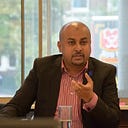Unpacking ‘Who do You think You are?” and “Where do You Come From?”
I must admit to being initially being apprehensive about answering the questions posed because it always is a tough one for me.
How do you define yourself? Do you talk about where you were born, your family background, your faith?
In recent weeks that question of who do you think you are has resonated widely in many parts of the world. As people of colour have questioned the role of key icons within their countries in promoting racism, slavery and others, they have been questioned as to their allegiances and asked to go back to where they came from. This us and them attitude has meant in many countries like the UK and USA, people of colour are still not seen equally as rightful people of the land. I have hated having that question thrown to me.
When people ask where do you come from? I Say British. But this isn’t enough. Where do you come from? I come from Kent, the garden of England. No that’s not good enough. Where do you really come from? Then I get it, I can’t be British because I am not white and my name is Arabic sounding.
But that doesn’t take away who I am or where I come from: I am British but I have Sri Lankan heritage as my parents are Sri Lankan; I was born in Nigeria and grew up in Ethiopia so I embrace my East and West African Influence. I currently live in Switzerland so have come to accept the Swiss nuances. I am also proudly Muslim in my spirituality, my code of conduct, my outlook on life.
Identity in my opinion and experience has became a conglomerate of 5 things: defining where you came from, who you are, what makes you tick; what makes you do what you do & why you do all that you do
These 5 components mean that identity is not fixed or static and in fact is very dynamic and evolving. One can have multiple identities which are not limiting in their nature. Nobel Laureate Professor Amartya Sen’s premise in his book ‘Identity and Violence’ is that the key to good citizenship and social cohesion is the encouragement and retention of multiple identities. People have several enriching identities: nationality, gender, disability, age and parental background, religious or professional affiliation. They identify with different ethnic groups and races, towns or villages they call home, sometimes football teams; they speak different languages, which they hope their children will retain, and love different parts of their countries. It is the recognition of this plurality and the searching for commonalities within this pluralism that will lead to greater respect and ultimately understanding and acceptance.
Thus ‘who do you think you are?’ or ‘where do you come from’ ultimately is about having and recognizing these multiple identities which allows us to to live together as the global tribe we have become. Hence for me it is not about who I am per se but what I do with who I am? If we were born with some privilege (whether it is education, wealth, colour, gender, ability, age, health), then how did we use that benefit to be able to help those who did not share the same opportunities as us?
This is what we will ultimately be judged on now and in the Hereafter!!
